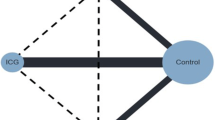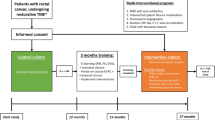Abstract
Aims
Anastomotic leakage is one of the most worrisome complications in colorectal surgery. An expert meeting was organized to discuss and find a consensus on various aspects of the surgical management of colorectal disease with a possible impact on anastomotic leakage.
Methods
A three-step Delphi-method was used to find consensus recommendations.
Results
Strong consensus was achieved for the use of mechanical bowel preparation and oral antibiotics prior to colorectal resections, the abundance of non-selective NSAIDs, the preoperative treatment of severe iron deficiency anemia, and for attempting to improve the patients’ general performance in the case of frailty. Concerning technical aspects of rectal resection, there was a strong consensus in regard to routinely mobilizing the splenic flexure, to dividing the inferior mesenteric vein, and to using air leak tests to check anastomotic integrity. There was also a strong consensus on not to oversew the stapled anastomoses routinely, to use protective ileostomies for low rectal and intersphincteric, but not for high-rectal anastomoses. Furthermore, a consensus was reached in regard to using CT-scans with rectal contrast enema to evaluate suspected anastomotic leakage as well as measuring C-reactive protein routinely to monitor the postoperative course after colorectal resections. No consensus was found concerning the indication and technique for testing bowel perfusion, the routine use of endoscopy to check the integrity of the anastomosis, the placement of transanal drains for rectal anastomoses and the management of anastomotic leakage with peritonitis.
Conclusion
Consensus could be found for several practice details in the perioperative management in colorectal surgery that might have an influence on anastomotic leakage.










Similar content being viewed by others
References
van de Wall BJM, Stam MAW, A. (2017) DW, Stellato R, Bemelman WA, A. BM, et al. Surgery versus conservative management for recurrent and ongoing left-sided diverticulitis (DIRECT trial): an open-label, multicentre, randomized controlled trial. Lancet Gastroenterol Hepatol 2:13–22
Bakker IS, Grossmann I, Henneman D, Havenga K, Wiggers T (2014) Risk factors for anastomotic leakage and leak-related mortality after colonic cancer surgery in a nationwide audit. Br J Surg 101(4):424–432 discussion 32
Blok RD, Stam R, Westerduin E, Borstlap WAA, Hompes R, Bemelman WA et al (2018) Impact of an institutional change from routine to highly selective diversion of a low anastomosis after TME for rectal cancer. Eur J Surg Oncol 44(8):1220–1225
Hain E, Maggiori L, Manceau G, Mongin C (2017) Prost AlDJ, Panis Y. Oncological impact of anastomotic leakage after laparoscopic mesorectal excision. Br J Surg 104(3):288–295
den Dulk M, Smit M, Peeters KC, Kranenbarg EM, Rutten HJ, Wiggers T et al (2007) A multivariate analysis of limiting factors for stoma reversal in patients with rectal cancer entered into the total mesorectal excision (TME) trial: a retrospective study. Lancet Oncol 8(4):297–303
Charitou T, Srihari S, Lynn MA, Jarboui MA, Fasterius E, Moldovan M et al (2019) Transcriptional and metabolic rewiring of colorectal cancer cells expressing the oncogenic KRAS(G13D) mutation. Br J Cancer 121(1):37–50
Shogan BD, Belogortseva N, Luong PM, Zaborin A, Lax S, Bethel C et al (2015) Collagen degradation and MMP9 activation by Enterococcus faecalis contribute to intestinal anastomotic leak. Sci Transl Med 7(286):286ra68
Shogan BD, Smith DP, Christley S, Gilbert JA, Zaborina O, Alverdy JC (2014) Intestinal anastomotic injury alters spatially defined microbiome composition and function. Microbiome 2:35
Olivas AD, Shogan BD, Valuckaite V, Zaborin A, Belogortseva N, Musch M et al (2012) Intestinal tissues induce an SNP mutation in Pseudomonas aeruginosa that enhances its virulence: possible role in anastomotic leak. PLoS One 7(8):e44326
Garfinkle R, Abou-Khalil J, Morin N, Ghitulescu G, Vasilevsky CA, Gordon P et al (2017) Is there a role for oral antibiotic preparation alone before colorectal surgery? ACS-NSQIP Analysis by Coarsened Exact Matching. Dis Colon Rectum 60(7):729–737
Midura EF, Jung AD, Hanseman DJ, Dhar V, Shah SA, Rafferty JF et al (2018) Combination oral and mechanical bowel preparations decreases complications in both right and left colectomy. Surgery 163(3):528–534
Scarborough JE, Mantyh CR, Sun Z, Migaly J. Combined mechanical and oral antibiotic bowel preparation reduces incisional surgical site infection and anastomotic leak rates after elective colorectal resection: an analysis of colectomy-targeted ACS NSQIP. Ann Surg 2015;262(2):331–337.
Toh JWT, Phan K, Hitos K, Pathma-Nathan N, El-Khoury T, Richardson AJ et al (2018) Association of mechanical bowel preparation and oral antibiotics before elective colorectal surgery with surgical site infection: a network meta-analysis. JAMA Netw Open 1(6):e183226
McSorley ST, Steele CW, McMahon AJ (2018) Meta-analysis of oral antibiotics, in combination with preoperative intravenous antibiotics and mechanical bowel preparation the day before surgery, compared with intravenous antibiotics and mechanical bowel preparation alone to reduce surgical-site infections in elective colorectal surgery. BJS Open 2(4):185–194
Rollins KE, Javanmard-Emamghissi H, Acheson AG, Lobo DN (2019) The role of oral antibiotic preparation in elective colorectal surgery: a meta-analysis. Ann Surg 270(1):43–58
Toh JWT, Phan K, Ctercteko G, Pathma-Nathan N, El-Khoury T, Richardson A et al (2018) The role of mechanical bowel preparation and oral antibiotics for left-sided laparoscopic and open elective restorative colorectal surgery with and without fecal diversion. Int J Color Dis 33(12):1781–1791
Althoff FC, Neb H, Herrmann E, Trentino KM, Vernich L, Fullenbach C et al (2019) Multimodal patient blood management program based on a three-pillar strategy: a systematic review and meta-analysis. Ann Surg 269(5):794–804
Acheson AG, Brookes MJ, Spahn DR (2012) Effects of allogeneic red blood cell transfusions on clinical outcomes in patients undergoing colorectal cancer surgery: a systematic review and meta-analysis. Ann Surg 256(2):235–244
Leahy MF, Hofmann A, Towler S, Trentino KM, Burrows SA, Swain SG et al (2017) Improved outcomes and reduced costs associated with a health-system-wide patient blood management program: a retrospective observational study in four major adult tertiary-care hospitals. Transfusion 57(6):1347–1358
Choudhuri AH, Uppal R, Kumar M (2013) Influence of non-surgical risk factors on anastomotic leakage after major gastrointestinal surgery: Audit from a tertiary care teaching institute. Int J Crit Illn Inj Sci 3(4):246–249
Iancu C, Mocan LC, Todea-Iancu D, Mocan T, Acalovschi I, Ionescu D et al (2008) Host-related predictive factors for anastomotic leakage following large bowel resections for colorectal cancer. J Gastrointestin Liver Dis 17(3):299–303
Hayden DM, Mora Pinzon MC, Francescatti AB, Saclarides TJ (2015) Patient factors may predict anastomotic complications after rectal cancer surgery: Anastomotic complications in rectal cancer. Ann Med Surg 4:11–16
van Rooijen S, Carli F, Dalton S, Thomas G, Bojesen R, Le Guen M et al (2019) Multimodal prehabilitation in colorectal cancer patients to improve functional capacity and reduce postoperative complications: the first international randomized controlled trial for multimodal prehabilitation. BMC Cancer 19(1):98
Weimann A, Braga M, Carli F, Higashiguchi T, Hubner M, Klek S et al (2017) ESPEN guideline: Clinical nutrition in surgery. Clin Nutr 36(3):623–650
Burton TP, Mittal A, Soop M (2013) Nonsteroidal anti-inflammatory drugs and anastomotic dehiscence in bowel surgery: systematic review and meta-analysis of randomized, controlled trials. Dis Colon Rectum 56(1):126–134
Bakker N, Deelder JD, Richir MC, Cakir H, Doodeman HJ, Schreurs WH et al (2016) Risk of anastomotic leakage with nonsteroidal anti-inflammatory drugs within an enhanced recovery program. J Gastrointest Surg 20(4):776–782
Smith SA, Roberts DJ, Lipson ME, Buie WD, MacLean AR (2016) Postoperative nonsteroidal anti-inflammatory drug use and intestinal anastomotic dehiscence: a systematic review and meta-analysis. Dis Colon Rectum 59(11):1087–1097
Peng F, Liu S, Hu Y, Yu M, Chen J, Liu C (2016) Influence of perioperative nonsteroidal anti-inflammatory drugs on complications after gastrointestinal surgery: a meta-analysis. Acta Anaesthesiol Taiwanica 54(4):121–128
Bhangu A, Singh P, Fitzgerald JE, Slesser A, Tekkis P (2014) Postoperative nonsteroidal anti-inflammatory drugs and risk of anastomotic leak: meta-analysis of clinical and experimental studies. World J Surg 38(9):2247–2257
Kverneng Hultberg D, Angenete E, Lydrup ML, Rutegard J, Matthiessen P, Rutegard M (2017) Nonsteroidal anti-inflammatory drugs and the risk of anastomotic leakage after anterior resection for rectal cancer. Eur J Surg Oncol 43(10):1908–1914
Kawada K, Hasegawa S, Hida K, Hirai K, Okoshi K, Nomura A et al (2014) Risk factors for anastomotic leakage after laparoscopic low anterior resection with DST anastomosis. Surg Endosc 28(10):2988–2995
Chen H, Cai HK, Tang YH (2018) An updated meta-analysis of transanal drainage tube for prevention of anastomotic leak in anterior resection for rectal cancer. Surg Oncol 27(3):333–340
Xiao L, Zhang WB, Jiang PC, Bu XF, Yan Q, Li H et al (2011) Can transanal tube placement after anterior resection for rectal carcinoma reduce anastomotic leakage rate? A single-institution prospective randomized study. World J Surg 35(6):1367–1377
Singh PP, Zeng IS, Srinivasa S, Lemanu DP, Connolly AB, Hill AG (2014) Systematic review and meta-analysis of use of serum C-reactive protein levels to predict anastomotic leak after colorectal surgery. Br J Surg 101(4):339–346
Dalkey N, Helmer O (1963) An experimental application of the Delphi method to the use of experts. Manag Sci 9:458–467
Powell C (2003) The Delphi technique: myths and realities. J Adv Nurs 41(4):376–382
Avella JR (2016) Delphi panels: research design, procedures, advantages, and challenges International. Int J Dr Stud 11:305–321
Buia A, Post S, Buhr HJ, Hanisch E (2019) Bowel preparation for elective colorectal surgery in Germany 2017: results of a survey among members of the German Society of General and Visceral Surgery. Chirurg 90(7):564–569
Acknowledgments
We thank all participants of the Delphi process and consensus conference for their contributions and Dr. Marc Immenroth for his support on data processing and statistical evaluation. Finally, we thank Hartmut Werlich from Johnson&Johnson for his significant support in organizing all steps of the Delphi process and for organizing the consensus meeting.
Author information
Authors and Affiliations
Corresponding author
Ethics declarations
Conflict of interest
All authors declare that they have no conflict of interest.
Ethical approval
This article does not contain any studies with human participants or animals performed by any of the authors.
Additional information
Publisher’s note
Springer Nature remains neutral with regard to jurisdictional claims in published maps and institutional affiliations.
Rights and permissions
About this article
Cite this article
Rink, A.D., Kienle, P., Aigner, F. et al. How to reduce anastomotic leakage in colorectal surgery—report from German expert meeting. Langenbecks Arch Surg 405, 223–232 (2020). https://doi.org/10.1007/s00423-020-01864-5
Received:
Accepted:
Published:
Issue Date:
DOI: https://doi.org/10.1007/s00423-020-01864-5




